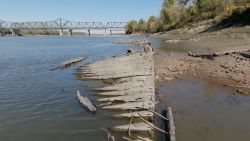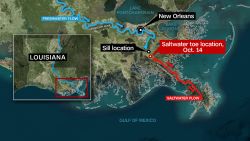Story highlights
Senior members of the military have argued climate change is a national security threat
A 2016 report warned climate change could ultimately cause nations to collapse
As President Donald Trump contemplates withdrawing the US from the landmark Paris climate accord, he may be turning his back on some crucial national security views, starting with the opinion of his own Defense Secretary, James Mattis.
During his confirmation process in January, Mattis responded to a question from the Senate Armed Services Committee about whether climate change is a security threat, writing: “Climate change can be a driver of instability and the Department of Defense must pay attention to potential adverse impacts generated by this phenomenon.”
Mattis went on to say, “climate change is a challenge that requires a broader, whole-of-government response,” adding that he would “ensure that the Department of Defense plays its appropriate role within such a response by addressing national security aspects.”
For those who follow Mattis’ views on environmental challenges, it wasn’t a surprise. In 2010, while still on active duty, his command issued a report on future trends facing the military. That report noted: “The impact of climate change, specifically global warming and its potential to cause natural disasters and other harmful phenomena such as rising sea levels, has become a concern.”
A CNN military analyst, retired Lt. Gen. Mark Hertling, said climate change is a vital national security issue.
“You have seen war games where there have been indicators that in the future there could be fights, wars, over water supplies,” he said. “You have seen the potential for cities along the shore to be submerged and cause multiple problems.”
Challenges ahead
Those concerns have also been stated by the intelligence community, at least during the Obama administration.
A September 2016 report on the national security implications of climate change noted: “Many countries will encounter climate-induced disruptions – such as weather-related disasters, drought, famine, or damage to infrastructure – that stress their capacity to respond, cope with, or adapt. Climate-related impacts will also contribute to increased migration, which can be particularly disruptive if, for example, demand for food and shelter outstrips the resources available to assist those in need.”
The report includes a stark warning: “When climate-related effects overwhelm a state’s capacity to respond or recover, its authority can be so undermined as to lead to large-scale political instability. Countries with weak political institutions, poor economic conditions or where other risk factors for political strife are already present will be the most vulnerable to climate-linked instability. In the most dramatic cases, state authority may collapse partially or entirely. “
For the US, there are challenges ahead. The US Navy has analyzed the impact of rising sea levels on its coastal naval bases. And there are strategic concerns that melting Arctic ice could give Russia new navigable waterways to expand their naval and commercial maritime operations.
“It just gives them a wider berth in terms of naval forces. I mean, there’s all sorts of things, some of which are classified, in terms of what the Russians might do in the North Sea,” Hertling said.
New warm water ports and wider sea lanes mean Russian submarines and warships have great freedom to operate year-round.
The intelligence community’s stance on climate change has been criticized by Republicans in Congress who question whether it should be part of their portfolio. In fact former Congressman Mike Pompeo, during his confirmation hearing to become CIA director largely demurred on answering any questions about it. In a recent hearing on Capitol Hill on worldwide threats, the Director of National Intelligence Daniel Coats showed a little more public flexibility.
When asked if climate change risks should be part of national security strategy, Coats said: “We should be assessing what the consequences of changes that are relevant to security issues – that should be part of the assessment, and it is.”



















